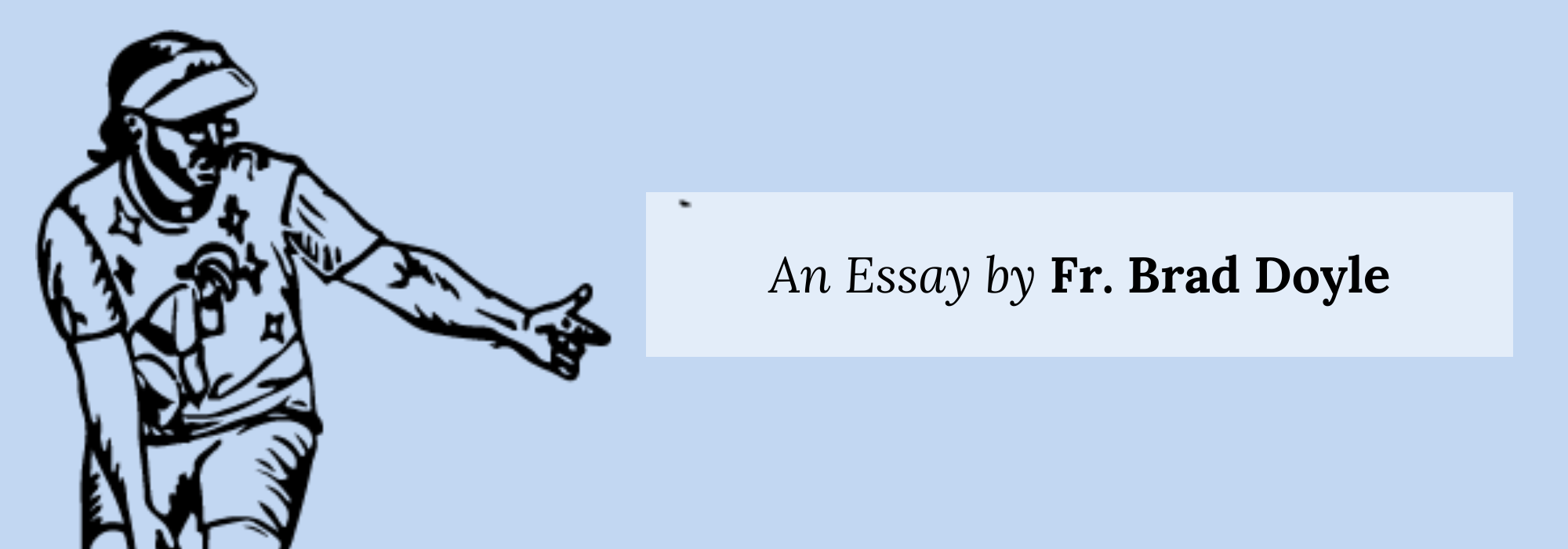The Secular Priest for a Secular Age
I don’t know how other priests put their names in the hat for parish assignments. Some dioceses don’t even let you ask. I’m sure many that do ask write a formal email to the bishop cc’ing the vicar general. I’ve only asked for an assignment once, and the vicar general was sitting in his recliner beside me. It was in the height of the COVID lockdown and we each had a COVID-era sized pour of an Old Fashioned. I had heard rumors that Our Lady of Mount Carmel would possibly be open as an assignment that upcoming year, so five sips in I texted my bishop, and a few months later, I got the call.
I had been to St. Francisville a few times, for day trips and friends’ weddings. If you know about St. Francisville, you know it’s no Molokai and I’m no Damien. It is a quaint town of only 1,500 or so residents. Though small, it packs a mighty tourism punch. Little boutiques dot the one street downtown. Bed & Breakfast Inns are a staple. As you cruise down its only main road, Ferdinand St., you are welcomed by historic homes, well kept, some of which are antebellum, all of which add their unique natural character. Unlike many places in South Louisiana, St. Francisville has not historically boasted a deep Catholic culture. In the 18th century, Franciscan Capuchins from Pointe Coupee would cross the Mississippi to bury their dead in the bluffs during rainy season, but most of the time, the population was made up of English Episcopalians and Methodists. Even so, there has always been a Catholic presence, even if a small one.
At the end of Ferdinand Street, just before dropping down toward the river, you reach Catholic Hill. Archbishop Perche of New Orleans must have had a keen eye for location, because in 1871 he told the Catholics of the town to “buy that hill and build a church,” as legend goes, with the plans of General P.T. Beauregard. Our Lady of Mount Carmel Church sits prominently on the highest point of St. Francisville overlooking Bayou Sara, the once thriving port city, now practically deserted due to the great flood of 1929.
My first day as a first time pastor was in the summer of ’21. After a meeting with my office staff, I asked them, “Where should I go to get dinner and meet the townies?” They directed me to The Saint, the upscale bar in the middle of town. As I walked up to the front porch, an excited woman leapt from her rocking chair, drink sloshing around, and exclaimed, “You’re our new priest!” Quite certain that she was a Catholic , I asked how long her family had been parishioners. “Oh, I’m Methodist,” she said, “but you’re our new priest.”
That shocked me. I was the TOWN’s new priest. Baptists, Methodists, Presbyterians, fallen away Catholics, the people that have had one too many at the Oyster Bar, the coffee crew on Tuesdays at Birdman, all had a new Catholic priest. Surely, everyone had their own preachers and ministers and barstools that they loved and cherished, but there was a place for me. And not just a place, but a duty. A happy houring Methodist slinging a gin & tonic had pithily exclaimed the true heart of Can. 528 §1, which begins, “A pastor is obliged to make provision so that the word of God is proclaimed in its entirety to those living in the parish.”
This is the universal mission of the parish priest. By that, I don’t mean he has a mission to all parts of the world. I mean, he has a mission to all parts of his parish. Traditionally this is called a pastor’s “care of souls.” The pope has care of souls for the entire world, the bishop his entire diocese, and the priest’s duty is the salvation of every person living in the parish boundaries, whether they are Catholic or not. The left end of the bar in the St. Francisville Inn is in my parish, not just technically, but truly. I have aggressively been ministering there since my first day’s arrival.
If you travel outside the city limits you enter the rest of the large geographical area of my church parish. It’s one and a half civil parishes, the Felicianas. Deep in their hills are my other parishioners. I quickly realized that along with the Louisiana State Penitentiary were sundry other institutions, East Louisiana Hospital, the LA War Veterans Home, and Dixon Correctional Center. My first visit to Dixon was a full year into my time at the parish because COVID restrictions had kept any visitors out. I was greeted by five Catholic inmates in the interdenominational chapel. There was a drum set in the corner and the altar was to the side, the pulpit in the middle. Sam, the sacristan, helped me reverse the Reformation. These men had not seen a Catholic minister in 2 years. They had not seen a priest in longer, no confession, no Eucharist. Even further back they would have Mass once a year at Christmas, being faithfully served by deacons of the diocese the rest of the year.
I opened my travel kit and started laying out the vessels. After the pleasantries and before the sign of the cross, one of the inmates spoke up, “Father, do you think you could come every week?” Falling into a selfish trap, I felt a bit annoyed. I had fought to get in, driven to Jackson, gotten my car searched, waddled with gilded purple vestments past sex offenders. I have another prison, two other churches, and 550 other families. Was he not grateful? “Let’s make that the intention for the Mass,” I suggested. “I’ll pray about it.” I fully intended to commit to one day a month. We sang a cappella, and when I began to read the gospel, a tear dropped down my cheek.
At the sight of the crowds, his heart was moved with pity for them because they were troubled and abandoned, like sheep without a shepherd. Then he said to his disciples, “The harvest is abundant but the laborers are few; so ask the master of the harvest to send out laborers for his harvest.”
I closed the lectionary. “Well guys, it looks like I’ll be coming more often.”
My ministry in the prisons of the Felicianas, while not a very large percentage of my time, has been the most surprising grace of being a pastor. It’s simple. That’s the only way I can explain it. It’s easy to preach in a prison because things are clear. There is good and there is evil. There is a lot of evil in these places, but there are no pretensions, the guys sing loudly and terribly, and there is a lot of good as well.
A major lesson I’ve learned becoming a pastor, and a rural pastor particularly, I’ve learned naturally. The lesson hasn’t so much arrived in my head, as it has manifested in my life. I don’t want to leave. Trips to New Orleans have become less frequent. I’ve even struggled to make it into Baton Rouge, my hometown.
As my first years as pastor progressed, I began to experience that my presence in the goings and coming of St. Francisville was an important part of my ministry. This presence is not simply relegated to “churchy” events like Mass and adoration and procession. Truly, my parish is not afraid of walking through the historic district of the town with Jesus, canopies, and smoke rising through the air. We boldly practice the ancient faith with all the pomp and aesthetic rigor of our church’s tradition. But there is something to be said for walking the historic district in my tennis shoes with my hat on backwards ready to flash an almost constant wave as cars give me a “hello honk.” I do my fair share of hello honks myself. It’s not a part of the town ordinances, but it’s important none the less.
I would say that this type of ministry is called the incarnational ministry of the parish priest. Here in my assignment, there are two events that I believe fit this bill. One is the monthly trivia nights that I lead called “Trivia w/ the Padre.” These nights are hosted at the previously mentioned Oyster Bar, which, ironically, has never sold oysters. It serves up beers, and in the distant past it served up bar fights. These days it is under new ownership, the civil parish president, and has a spruced up interior and a generally more manageable clientele. Don’t get me wrong, it is a dive bar, but in this place you will find the mayor, the biker, the tourist, and the parish priest.
People’s first question, when they hear that the priest runs a trivia night is always, “So, is this catechism questions or what?” I generally scare them by asking something like, “What 19th century pontiff is famous for writing the seminal encyclical of Catholic Social Doctrine called Rerum Novarum?” Obviously I am joking, but if the you get that question right, you know you are a Catholic nerd. The answer is Pope Leo XIII. Now, what number does XIII represent…sorry, I’ll move on.
In truth “Trivia w/ the Padre” nights boast just regular questions; trivia as it’s called. My justification for this is twofold; one, because all things (sports, literature, politics, art, music, etc.) are catholic by definition, because catholic means universal, and two, because what wandering rough and tumble sheep is going to show up at catechism trivia? The fruit of these nights is also twofold; one, I get to have fun (I love bar trivia), and two, many people who would never ring the rectory doorbell find it easier to talk after buying me a beer on their own turf. It just so happens to be my turf as well.
I don’t lead these nights as some sort of contrived attempt at sneaking in evangelical motives. My evangelical motives are generally not sneaky. I truly love trivia and I truly love these people. This manifestation of the incarnational ministry of priesthood has graced my life with convalidations, confessions, converts, annulments, and many drinks.
The second event that represents the incarnational model is the Christmas in the Country Parade. More specifically, it is the middle aged male dancing crew that marches in it. I am a founding member and we call ourself the Hwy 61 Bluffers: The Dancing Dad-bods of West Fel. I do not have time to elaborate. You’ll have to use your imagination or show up for the parade the first Sunday of December.
The patron saint of parish priests is St. Jean Vianney, the Curé d’Ars. On his way to his own rural parish he famously said to the boy guiding him, “you have shown me the way to Ars, now I will show you to heaven.” While this might sound a bit grandiose to modern ears, possibly the 19th century embellishment of hagiography, I believe that the sentiment holds true for the priests of the 21st century. The mission of every priest is the salvation of souls. The means of that salvation is solidly obtained through the grace of Jesus Christ, the bridegroom of the Church. Christ redeems and sanctifies his bride through the sacraments. That is true of the 19th century, it's true of the 21st century, and it will be true as long as the church militant battles through history.
Most people would call their ordinary, run of the mill pastor a "parish priest" or often a "diocesan priest." In New Orleans I'm often asked, "Fatha, are you a Jesuit?" It must be the hair. Depending on the accent, I can deduce whether this inquiry is friendly or antagonistic. I prefer the older and lesser known title of secular priest. The ecclesiastical distinction is not meant to imply that the diocesan priest is somehow sinful or lacking in religious ardor. Rather, the title of secular priest signifies that a parish priest's mission is to minister to and sanctify the people of a particular place and a particular age (saeculum in Latin.)
There is no doubt in my mind that if the Curé d’Ars himself were to witness the Dancing Dad Bods of West Fel sliding through the streets of St. Francisville, led by their pastor, he would swiftly backhand the Curé d’Saint Francisville. He would turn over the trivia tables and drive me out of the Oyster Bar with cord and zeal. And I wouldn’t blame him. God creates ministers for specific times and specific places. Divinity entered history at a particular moment of time. The scandal of the incarnation is not separated from his ministers. The scandal of the historicity of Christ is the same scandal of the historicity of His Church.
Jesus Christ is the same yesterday, today, and forever. His love will always be poured out from His pierced side through the reception of the sacraments He founded and by the Church He instituted. The pastoral methods are what develop. The post-nicene church needed the desert fathers. The vandalized church needed the protections of the abbey. The medieval church needed the radical witness of the Jongleur of Assisi. Ars needed its Curé. And I don’t believe that it's too presumptuous to say that every parish, whether it is rural, urban, old, or young, needs the pastoral genius and incarnational presence of its pastor.
[This essay originally appeared in the Summer 2024 issue of Joie de Vivre. To order this issue or an annual subscription, click the Subscribe tab above.]
Rev. Brad Doyle is a priest of the Diocese of Baton Rouge. He is pastor of Our Lady of Mount Carmel.




